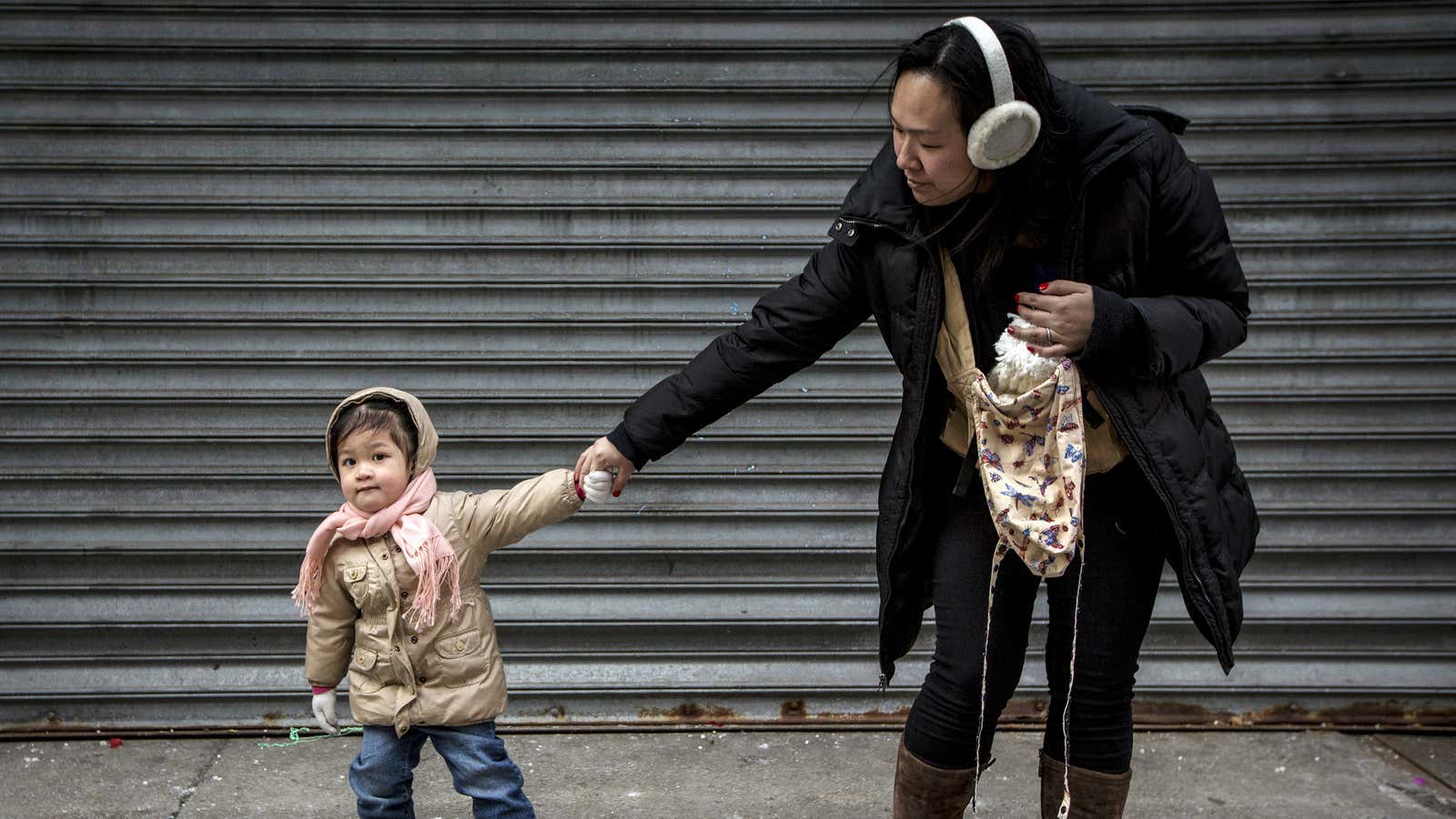There is little love for helicopter parenting these days. All that hovering and coddling of kids has been implicated in everything from rising levels of teen anxiety to the inability of college-age kids to do their laundry.
But a new paper suggests that there is a surprising amount of consensus behind intensive parenting as the best way to raise children. Patrick Ishizuka, a postdoctoral fellow at Cornell University in New York, surveyed a nationally representative group of 3,642 American parents of elementary school kids about parenting styles and found that regardless of education, income or race, the all-in approach had almost universal appeal.
“College graduates and non-college graduates, high and low-income parents, all these groups report remarkably similar support for intensive parenting,” Ishizuka said.
While the study looked at the beliefs of American parents, overprotective parenting is a global phenomenon: In Nordic countries, for example, hovering moms and dad are called curling parents.
The paper, “Social Class, Gender, and Contemporary Parenting Standards in the United States: Evidence from a National Survey Experiment”, starts with the modern parenting paradox. Mothers and fathers spend significantly more time with their children than parents from the 1960s, while simultaneously working more. The benign neglect of the 1970s has morphed into an involvement in all aspects of children’s lives (and parents are tired).
But it remains debatable whether this intensive approach is concentrated among middle and upper class families, or is more widely shared across class and gender. It is well documented that educated parents are more likely to enroll their kids in extra curricular activities; to talk, reason and negotiate more; and to participate more in their children’s schooling (these are dubbed parenting “behaviors”). Kids of more educated and wealthier parents also graduate from high school at higher rates, and attend college more, suggesting these differences have significant implications for inequality (pdf).
Ishizuka’s paper attempts to understand whether the difference in behaviors is rooted in a difference of opinion about parenting styles, or something else. He found it was not a difference of opinion.
“Parents of different social classes express remarkably similar support for intensive mothering and fathering across a range of situations, whether sons or daughters are involved,” he writes. “These findings suggest that cultural norms of child-centered, time-intensive mothering and fathering are now pervasive, pointing to high contemporary standards for parental investments in children.”
The study asked parents to read vignettes and rate two approaches: a “concerted cultivation response” or a “natural growth response.” The terms come from sociologist Annette Lareau, who suggested that middle-class parents tended to prefer the more-intensive “concerted cultivation” parenting approach, whereas poor and working-class parents gravitate to a less-intensive “accomplishment of natural growth.” Here is an example of a vignette presented by the researchers to participating parents:
Parenting situation: While Kim is busy getting things ready for her son’s first day of school tomorrow, her son asks if she will draw pictures with him.
Concerted cultivation response: Kim sits down to draw with her son. Then Kim says: “You’re so creative! Should we sign you up for art lessons?”
Natural growth response: Kim tells her son she’s busy right now. Then Kim says: “How about you work on some drawings and I’ll try to look at them later?”
The structure of the questions was meant to protect against parents answering what they thought they should answer (so called “social desirability bias”), and just rate the objective vignette—which avoids terms like mother and father, and is not personal to the respondent.
If it is not outlook that shapes different outcomes between classes, Ishizuka suggests it could be resources—poorer parents don’t have the money or time to invest in extracurricular activities and endless negotiations. But he says his study does not provide the evidence to support that.
“If we think that poor and working class parents have fundamentally different views, then we have to think about where those attitudes some from and can they be changed,” he said. “If they have the desire to engage in [intensive parenting] but their behavior doesn’t match up, that means we have to look at other potential factors intervening between attitudes and behaviors, which could include differences in money, in family structure, and the kinds of resources they have access to,” such as neighborhoods and schools.
The paper also showed respondents overwhelmingly believed that intensive parenting should be shared, with mothers and fathers engaged in it equally. However, the study did not report on frequency. In other words, it asked parents to rate which approach was better, but it did not ask whether this approach should be used in all situations (negotiating rules, organizing a child’s free time, how kid’s interact with institutions) rather than just the one presented.
